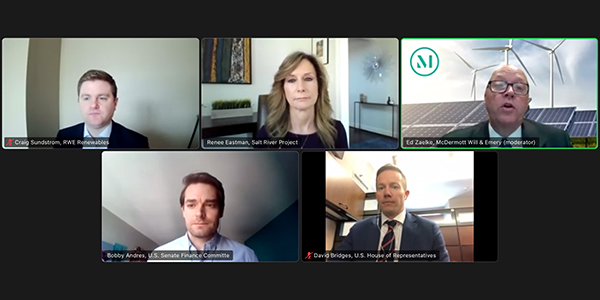With Democrats holding slim majorities in both chambers of Congress, Democratic Sen. Joe Manchin from West Virginia has outsize influence on energy and environmental legislation.
“I’m an all-in energy person,” Manchin said Wednesday during his keynote speech for the American Council on Renewable Energy (ACORE) Policy Forum.
For Manchin, “all-in” means support for cultivating U.S. energy independence through the use of domestic fossil fuel supplies in addition to the strategic use of tax credits and development and deployment of technology to spur the transition to clean energy.
As a lawmaker from a coal state, Manchin is bullish on using carbon capture technology as a tool to reach the country’s 2035 and 2050 decarbonization goals.
“Carbon capture sequestration is the one of the most important things that you can do because the rest of the world still has an appetite for fossil [fuel],” Manchin said. He added that China and India are still building coal-fired power plants and questioned whether they are using any technology to reduce emissions — a claim contradicted by a 2017 report from the Center for American Progress.
Even in the U.S., Manchin said, carbon capture technology has one big hurdle: the expense.
“We have not been able to do commercialization on carbon capture sequestration without being cost prohibitive,” Manchin said. “We have a lot to do there.”
The senator added that he wants to ensure the power grid works for “everyone” and that no one is left behind as fossil fuels and renewables jockey for economic position.
“You can’t leave any of these communities from traditional fuel sources behind,” Manchin said. “You can’t just say we’re moving to something without basically giving them an opportunity to participate in this transitioning economy.”
Manchin said communities built around the fossil fuel industry — such as West Virginia, Wyoming, Pennsylvania, Ohio and Kentucky — have done a lot of “heavy lifting” for the economy.
“Now they feel like they’re not good enough, clean enough, green enough or smart enough, and that’s just so wrong,” Manchin said.
He said there is a “political divide” on clean energy. If U.S. lawmakers “can’t get our act together … this environmental push that’s going on … it’ll be as divisive as healthcare was in 2009.”
Tax credits can be a divisive issue as well, Manchin said. Despite supporting an energy bill passed in December to extend investment tax credits for renewable energy sources such as solar and wind, the senator is “not a big tax credit guy.” He said the solar and wind industries have “matured” and that he needs to be sold on continuing those incentives “to the point of maybe beyond what’s needed.”
During a panel discussion that followed Manchin’s keynote, Bobby Andres, senior policy adviser to Democrats on the Senate Finance Committee, said the practice of voting on “stop-and-start extenders” on investment tax credits is an exercise that “nobody likes.”
“It’s a pain; it’s bad policy; it doesn’t end up working very well; and it blinds the effects of whatever incentive you’re trying to provide,” Andres said.
One necessary element for any meaningful progress, according to Manchin, is acceptance of a “set of facts” that “humans have had a tremendous impact on climate change.”
“When you have people that won’t even accept climate change as being real, then you got a problem,” Manchin said. “I think most people, even in hard energy-producing states such as West Virginia, they understand the transition’s coming. They don’t want to drink dirty water. They don’t want to breathe dirty air. I am not supporting the elimination of anything. I’m supporting innovating everything. That’s where we put our money where our mouth is. We’ll invest the dollars that it takes because it’s global climate. It’s not West Virginia’s climate. It’s not the United States climate. It’s not North American climate. It’s global.”





